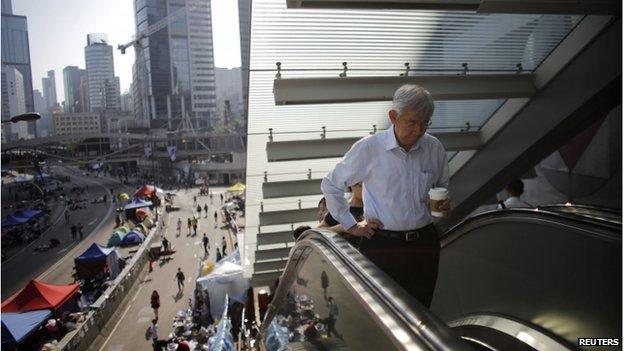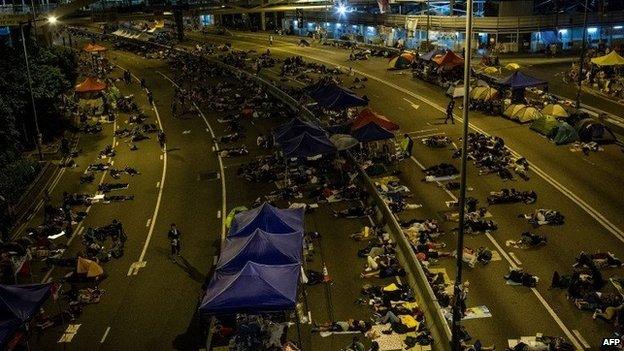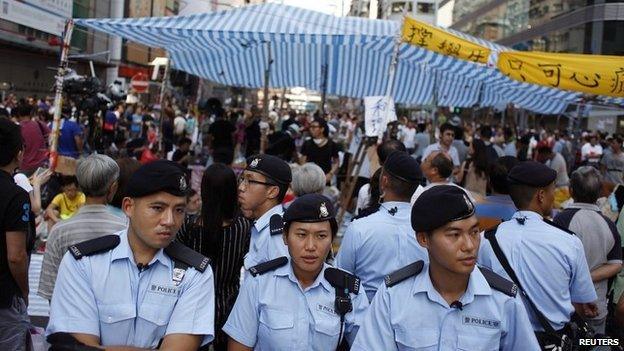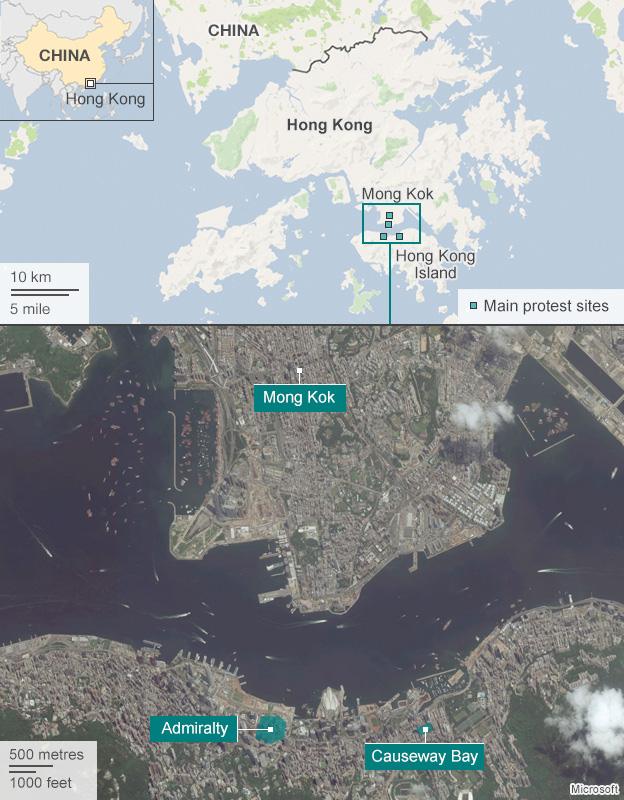Hong Kong protests: Civil servants work as numbers drop
- Published
The number of protestors appears to be dwindling
Hundreds of pro-democracy campaigners remain camped out on the streets of Hong Kong as a government deadline for them to leave passed without incident.
But their numbers have dwindled and civil servants have returned to work in the government's headquarters.
The protesters are angry at China's plans to vet candidates when Hong Kong holds elections in 2017.
They are demanding that the central government in Beijing allow a fully free vote for the territory's leader.
On Monday evening, more than 1,000 protesters remained in three key locations - a far smaller crowd than over the weekend.
The BBC's Juliana Liu in Hong Kong says protesters appear to have decided to beat a strategic, possibly temporary, retreat - partly out of sheer exhaustion, as the demonstrations entered their second week.
She says activists have been encouraged by news that student leaders have begun meeting government officials to lay the groundwork for talks on political reform.
The first round of talks ended on Sunday night without agreement but the two sides agreed to meet again on Monday evening.

Government employees returned to work on Monday morning
Tens of thousands of people have been on the streets in the past week, but only about 100 protesters remained outside government offices at the Admiralty protest site on Monday morning, and just 10 people were sitting outside the chief executive's office, according to the South China Morning Post, external earlier on Monday.
Several hundred remain in Mong Kok, north of the harbour, despite earlier calls by organisers for protesters to withdraw from that site, following clashes at the weekend with people opposed to the demonstrations. A smaller number of protesters are still camped out at Causeway Bay.
Police said on Monday that at least 37 people had been arrested so far in Mong Kok. They said five others had been arrested for allegedly hacking government websites.

Analysis: John Sudworth, BBC News, Hong Kong
There have been moments over the past week when it has seemed as if the protests might dwindle of their own accord.
Many protesters know that, in reality, there is little chance of Beijing agreeing to give Hong Kong any more democracy and so, perhaps, all the authorities have needed to do is wait for fatigue and the feeling of futility to take their toll.
But instead the opposite has happened. The tear gas last weekend, the sinister mob attacks of this weekend and then the apparent ultimatum issued by Hong Kong's leader have all served to galvanise support and strengthen the protesters' resolve.
Last night, the widely anticipated attempt to clear the protesters from the street, ahead of the Monday morning deadline, never came. Recognition, perhaps, that if there's anything that protest movements fear as much as the threat of force, then it's being ignored.

Overnight, some protesters in Central dismantled barricades and cleared roads so government officials could get in to work.
The remaining protesters had slept peacefully on Sunday night on mats laid out across the eight-lane highway that runs through the financial district.
Alex Chow, secretary-general of one of the main protest movements, the Hong Kong Federation of Students, told reporters he was not worried about the crowd dwindling. He said "people need rest, but they will come out again. It doesn't mean the movement is diminishing. Many people still support it."
Over the weekend Hong Kong Chief Executive CY Leung had called on the protesters to end the demonstrations, warning that police had a responsibility to take all actions necessary to resume order.
He said civil servants had to return to work and children needed to go to school.
Protest groups had said they would agree to the government's offer of talks if the attacks on them were investigated and protest sites were not forcefully cleared.
But discussions about opening a formal dialogue faltered after the sides failed to agree on basic principles on which the talks should be held.

The remaining protesters slept peacefully on the main road of Hong Kong's financial district on Sunday night

Hong Kong's leader said police had a responsibility to restore social order if protesters refused to go home
The talks had originally been scheduled for Saturday, but protesters withdrew after the attacks, which were mainly in the Mong Kok district.
Student activists say they will keep up their protests until details of the talks are worked out.
The Chinese Communist Party-owned People's Daily newspaper, which has published front-page editorials criticising the protests in recent days, ran three pieces on the protests in its Monday edition.
One quoted experts saying that "most Hong Kong residents will sensibly make up their own minds about the situation and will support the special administrative region's lawful governance".
What began as a peaceful sit-in to demand democracy on 22 September escalated when riot police used tear gas against unarmed students converging on the government headquarters.
The police response was widely condemned as an overreaction, prompting thousands of people to join the rallies.
China's insistence on tight rules on nominations for candidates wanting to stand for election in 2017 has angered pro-democracy campaigners, who say the polls will fall short of the free elections they are seeking and have called for Mr Leung to step down.

But the central government in Beijing has thrown its full support behind Mr Leung, calling the protests illegal and "doomed to fail".


Hong Kong democracy timeline
1997: UK gives Hong Kong back to China under a 1984 agreement giving it "a high degree of autonomy" for 50 years
2004: China says it must approve any changes to Hong Kong's election laws
June-July 2014: Pro-democracy activists hold an unofficial referendum on political reform; both sides hold large rallies
31 August 2014: China says it will allow direct elections in 2017 but will pre-approve candidates
22 September 2014: Student groups launch a week-long boycott of classes
28 September 2014: Occupy Central and student protests join forces and take over central Hong Kong
2017: Direct elections for chief executive due to take place
2047: Expiry of current agreements
